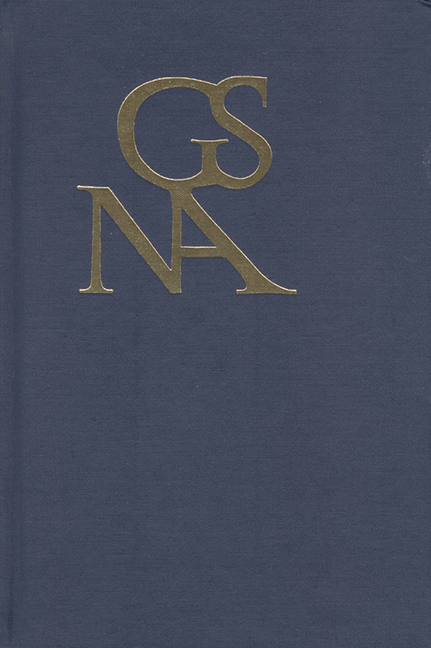Book contents
- Frontmatter
- Contents
- Special Section on What Goethe Heard, edited by Mary Helen Dupree
- What Goethe Heard: Special Section on Hearing and Listening in the Long Eighteenth Century
- Behind Herder's Tympanum: Sound and Physiological Aesthetics, 1800/1900
- Becoming the Listener: Goethe's “Der Fischer”
- Of Barks and Bird Song: Listening in on the Forgotten in Ludwig Tieck's Der blonde Eckbert
- Garden Empire or the Sublime Politics of the Chinese-Gothic Style
- Die Austreibung des Populären: Schillers Bürger-Kritik
- Goethe and the Uncontrollable Business of Appropriative Stage Sequels
- Repetition and Textual Transmission: The Gothic Motif in Goethe's Faust and “Von deutscher Baukunst”
- “Die gewalt'ge Heldenbrust”: Gender and Violence in Goethe's Iphigenie auf Tauris
- Literary Form and International World Order in Goethe: From Iphigenie to Pandora
- Two Gifts from Goethe: Charlotte von Stein's and Charlotte Schiller's Writing Tables
- Goethe's Wilhelm Meister and the Refusal to Grow Up: The Dialectics of Bildung
- “So steh' ich denn hier wehrlos gegen dich?”— Figures of Armament and Disarmament in German Drama before and after the French Revolution
- Goethe, Maimon, and Spinoza's Third Kind of Cognition
- Die Neuvermessung von Lyrik und Prosa in Goethes Novelle
- Book Reviews
“So steh' ich denn hier wehrlos gegen dich?”— Figures of Armament and Disarmament in German Drama before and after the French Revolution
from Special Section on What Goethe Heard, edited by Mary Helen Dupree
Published online by Cambridge University Press: 16 May 2018
- Frontmatter
- Contents
- Special Section on What Goethe Heard, edited by Mary Helen Dupree
- What Goethe Heard: Special Section on Hearing and Listening in the Long Eighteenth Century
- Behind Herder's Tympanum: Sound and Physiological Aesthetics, 1800/1900
- Becoming the Listener: Goethe's “Der Fischer”
- Of Barks and Bird Song: Listening in on the Forgotten in Ludwig Tieck's Der blonde Eckbert
- Garden Empire or the Sublime Politics of the Chinese-Gothic Style
- Die Austreibung des Populären: Schillers Bürger-Kritik
- Goethe and the Uncontrollable Business of Appropriative Stage Sequels
- Repetition and Textual Transmission: The Gothic Motif in Goethe's Faust and “Von deutscher Baukunst”
- “Die gewalt'ge Heldenbrust”: Gender and Violence in Goethe's Iphigenie auf Tauris
- Literary Form and International World Order in Goethe: From Iphigenie to Pandora
- Two Gifts from Goethe: Charlotte von Stein's and Charlotte Schiller's Writing Tables
- Goethe's Wilhelm Meister and the Refusal to Grow Up: The Dialectics of Bildung
- “So steh' ich denn hier wehrlos gegen dich?”— Figures of Armament and Disarmament in German Drama before and after the French Revolution
- Goethe, Maimon, and Spinoza's Third Kind of Cognition
- Die Neuvermessung von Lyrik und Prosa in Goethes Novelle
- Book Reviews
Summary
WITHIN THE HISTORY of European philosophy and literature, the discourse of the human has been closely tied to discourses on forms of governance. The constitution of the city, the republic, the nation, the military apparatus has been linked to that of the human by means of analogies that greatly impact how both the political and the individual are thought of. In Plato's Republic, for example, a group of discussants agrees that the soul is a tripartite entity composed of an appetitive, a spirited, and a rational part. The same structure, Socrates adds, comprises the city. In Book Four, the constituents of the city and the human soul are set side by side in pairs: the city's craftsmen and the appetites; the guardians of the city and the forcefulness of the spirit; the philosophers ruling the city and the rational capacities thought ideally to govern within a person.
Plato describes a harmonious relationship between the three parts of both city and individual as justice. The definition of such harmonious co-existence or justice comprises the main pursuit of the dialogues in the Republic (see 368d-e, 434d). Two explicitly stated prerequisites for its emergence are: that each part exclusively minds its own business and, secondly, that a topdown order of command is accepted, that is, the philosopher queens and kings’ position on top of the hierarchy must remain uncontested.
During the eighteenth century, the human-state analogy reappears in a variety of forms. The events leading up to and following the French Revolution necessitate new, secular societal founding narratives. Both political philosophies and anthropologies—two genres frequently amalgamated in the seventeenth and eighteenth centuries—meet this demand in alternately explanatory, descriptive, and prescriptive pamphlets that consider the nature of a just society and the “humanity” of the individual intricately intertwined.
Structural analogies between the political and the human entail significant consequences. Segregated into distinct elements and reliant on voluntary obedience, both the city and the human perform a precarious balance, one where harmonious co-existence easily drifts into conflict, and war appears as an integral component of the conceptual framework. Indeed, the text of the Republic implicitly acknowledges “civil war” as the norm in both city and individual.
- Type
- Chapter
- Information
- Goethe Yearbook 25Publications of the Goethe Society of North America, pp. 239 - 266Publisher: Boydell & BrewerPrint publication year: 2018

